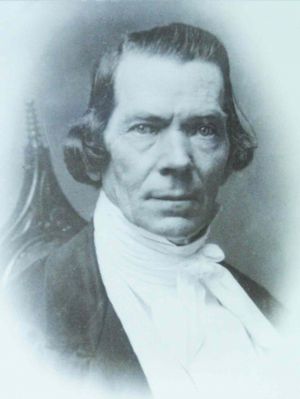William Whiting
William Whiting (1788-1873) - Thirteenth Master of Corinthian Lodge[edit]
Overview[edit]
Colonel William Whiting, born October 20, 1788, in Sterling, Massachusetts, was a significant figure in Concord for over sixty years. Serving as the thirteenth Master of Corinthian Lodge, Whiting led the Lodge during 1824-1826, 1832-1834, and 1845-1846. A devoted Mason, he influenced Masonic practices and helped establish educational and social reforms in Concord. His life was marked by public service, deep family devotion, and advocacy for temperance and abolition.
Early Life and Career[edit]
Born into a family with deep roots in New England's Puritan lineage, Whiting's ancestry included Rev. John Whiting, one of Concord’s early ministers, and the notable Puritan, Rev. Samuel Whiting of Lynn. Raised in modest conditions, Whiting’s early years were spent laboring on a farm until he moved to Concord at age eleven to live with his uncle, Dr. Joseph Hunt, who introduced him to education and trade skills. He trained in harness and chaise making with Henry Sanderson, ultimately setting up his own successful carriage and harness business with only $21 in capital.
Masonic Contributions and Leadership[edit]
Whiting joined Corinthian Lodge in 1819, advancing quickly through leadership roles: Junior Warden (1821-1823) and Master (1824-1826, 1832-1834, 1845-1846). His dedication to Masonry extended to serving as District Deputy Grand Master for multiple terms and as the first High Priest of the Concord Royal Arch Chapter. He introduced reforms, notably abolishing the practice of refreshments at Lodge meetings, and was instrumental in founding the current lodge building at 58 Monument Street.
Public and Civic Life[edit]
Whiting was deeply involved in civic life. A lifelong advocate for temperance, he pledged abstinence from alcohol at twenty-three and later quit tobacco after forty years of use. As a founding trustee of Concord Academy, he collaborated with prominent figures like Samuel Hoar to improve local education. Whiting was a regular participant in the Concord Lyceum, an educational forum, serving as a member and occasional president. Additionally, he was active in the abolition movement, hosting prominent figures like William Lloyd Garrison and John Brown, and assisting in the Underground Railroad by sheltering escaped slaves.
Business Success and Challenges[edit]
Despite multiple setbacks, including two devastating fires in 1823 and 1834 that destroyed his workshop and stock, Whiting rebuilt his business each time. His shop produced high-quality carriages that attracted customers from across New England and as far as New Orleans. However, the economic downturn of 1836-1837 led to financial difficulties, though Whiting managed to repay his debts with the help of his son, William Whiting Jr., who became a successful lawyer and eventually the solicitor of the War Department during the Civil War.
Family and Personal Life[edit]
In 1811, Whiting married Hannah Conant, with whom he shared a deep commitment to education and social reform. Together, they raised three children, including their son, William Jr., who achieved national prominence. Colonel Whiting's legacy includes his unwavering support for his family, community, and country. His descendants continued to honor his values through public service and academia.
Legacy and Death[edit]
William Whiting passed away on September 27, 1862, at the age of seventy-four. He died with his children by his side, witnessing the abolition of slavery—a cause he had fervently supported. He was buried with Masonic honors, and his life remains a testament to resilience, public service, and the pursuit of justice. Whiting’s influence on Concord’s social, educational, and Masonic fabric has left a lasting imprint on the town and its history.
